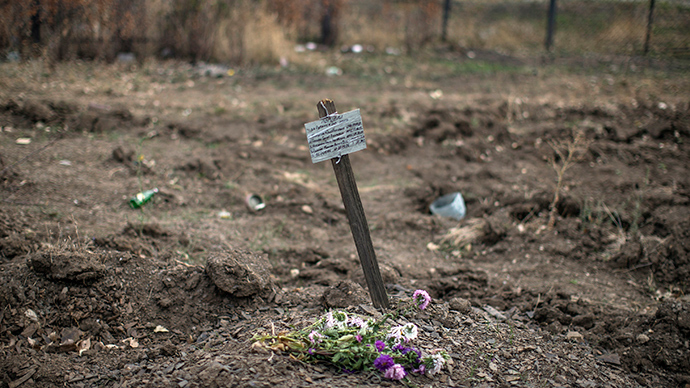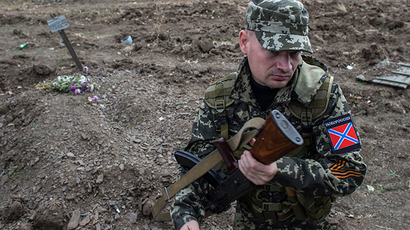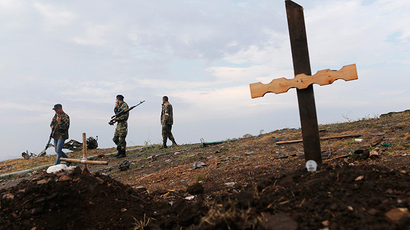'No mass killings or graves': Amnesty Int'l says only 'isolated' atrocities in E. Ukraine

Amnesty International became the first major international human rights groups to address the claims of mass killings in the Ukrainian conflict. However, it says it only found evidence of isolated incidents of war crimes by both Kiev and the militia.
Amnesty International performed its investigation into mass
graves allegedly discovered in Ukraine’s south-eastern Donbass
region in late August and late September, the organization
said.
The research only revealed evidence of “isolated
incidents” of summary killings and other atrocities
attributable to both sides, said John Dalhuisen, Europe and
Central Asia Director at Amnesty International.
“Amnesty International has not found or been presented with
any compelling evidence of mass killings or graves. What we have
seen are isolated incidents of summary executions that in some
cases constitute war crimes. These abuses must stop. All
suspected cases should be effectively investigated and those
responsible from both sides prosecuted,” Dalhuisen said.
“It’s difficult to get an accurate sense of the scale of these
abuses. It is likely that many have not yet been exposed and that
others have been deliberately misrecorded,” he added.
Dalhuisen urged both Kiev and the militias to “concentrate on
investigating and eliminating execution-style killings”
instead of “speculatively accusing each other of
abuses.”
Several days after media reports appeared of mass graves
discovered after the Kiev troops left the villages of Komunar and
Nizhnya Krynka in the Donetsk Region, the Amnesty delegation
arrived in the area, the report says.
READ MORE:3 mass graves found near Donetsk by self-defense forces, OSCE confirms
It adds that Amnesty International found strong evidence
implicating Kiev forces in the alleged extrajudicial executions
of four men buried in two graves near the village of Komunar.
They also discovered the burial site of five bodies, belonging to
militia fighters, who were allegedly killed during the
hostilities, but not executed.

As for the alleged crimes committed by the militias in Donetsk
and Lugansk, human rights group says they have confirmed two
cases of execution-style of killings of pro-Ukrainian activists
and detained Kiev fighters.
According to Amnesty International, the self-defense forces are
responsible for the killing of Vladimir Rybak, an MP from
Batkivshina (Fatherland) party, and Yury Popravko, a student from
Kiev.
Their bodies, which showed signs of torture, were found near the
town Raigorodok in Donetsk Region on April 19.
In another incident, two more men, who were held captive by the
rebels in the town of Severodonetsk in Lugansk Region, were
allegedly also executed.
READ MORE:Five Ukraine war tragedies: Questions unanswered, investigation drawn out
The human rights group’s findings in the area show that “some
of the more shocking cases that have been reported, particularly
by Russian media, have been hugely exaggerated,” Dalhuisen
stated without elaborating.
Instead, a statement on the organization’s website cited Russian
foreign minister, Sergey Lavrov, as one of the examples of such
exaggeration.
On October 1, the Russian Foreign Minister said that over 400
bodies have been reportedly recovered from mass graves in Donetsk
Region, calling on the international community to investigate the
atrocities.
Lavrov, however, referred to the words of Latvian human rights
activist, Einars Graudins, who visited the grave sites in the
area together with the regular OSCE (Organization for Security
and Co-operation in Europe) monitors.

Previously, RT reached out to several international human rights
organizations about their investigation into the found mass
graves as well as other atrocities in Ukraine, including the
Odessa massacre that saw almost 40 people killed in May, and the
so-called Maidan sniper killings when over 100 people were killed
by sniper fire in Kiev this February.
“At this moment, we don’t have any factual information about
the progress of these investigations, so it’s better not to
comment,” the reply by the OSCE said.
The office of the UN High Commissioner for Human Rights responded
by saying that “it is too early for us to speculate on
exactly what has happened here, or on who is responsible.”
READ MORE:Strong
proof Right Sector, National Guard linked to mass graves near
Donetsk – Moscow
Ukraine has been engulfed in internal military conflict since
April, when Kiev’s army began its crackdown on the southeast
regions of the country after they refused to recognize the
country’s new coup-imposed authorities.
The United Nations said that the death toll in the Ukrainian
conflict has exceeded 3,700 people, with over 9,000 others being
wounded.
The number of internally displaced Ukrainians has reached
842,000, with over a half of them finding refuge in Russia, the
UN said.
The warring sides agreed a ceasefire during talks in Minsk,
Belarus on September 5, but there is still a long way to go for
the conflict to be settled.
Kiev and its backers in the US and EU blame Russia for
masterminding the unrest and providing anti-Kiev rebels with
weapons and troops.
However, no convincing proof has been provided to back up the
claims, which have been repeatedly denied by Moscow.














